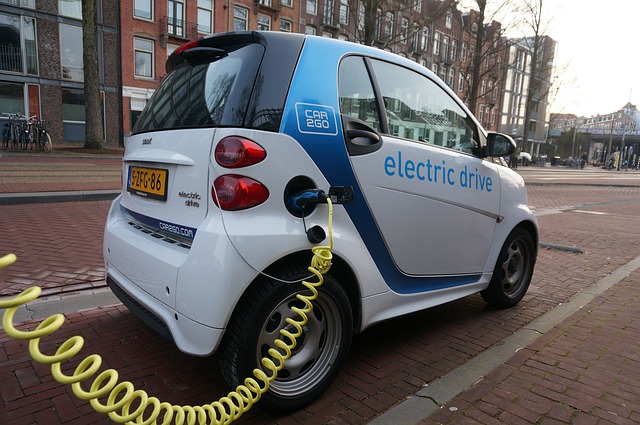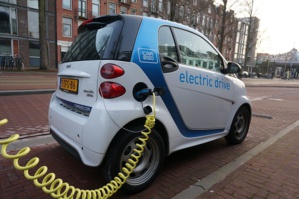Dailycsr.com – 24 June 2016 – Even though, the electric cars occupy only a small portion of today’s auto market, it has the potential to take over the bulk of the industry in the coming years. Bloomberg New Energy Finance recently came up with a study wherein it is stated that “electric vehicles would account for 35 percent of new light-duty vehicle sales by 2040”.
The electric car would also require electric charging points for refuelling itself; therefore a widespread adaptation would also be taking place across industry to accommodate the technology of electric vehicles.
According to the Senior Director of Business Development at ChargePoint, Tavis Szeto, the new electric car charging infrastructure would “resemble sharing economy stalwarts like Uber and Airbnb”, whereby he explains:
“Airbnb is the largest hotel chain, and they don’t own a single hotel,” he said. “Uber is the largest taxi company, and they don’t own a single car.”
Similarly, even though ChargePoint is the “largest electric car charging firm in the U.S.”, it does not own any charger. While, Ethicalperformance adds:
“Instead, the company (ChargePoint) sells charging stations to businesses that it then provides with cloud-based tools for managing the stations, allowing owners to, for instance, keep track of usage and set fee levels”.
Moreover, the Marketing Strategy Manager of ChargePoint, Grant Takahashi, explains the stance taken by ChargePoint towards charging centres of electric vehicles, whereby he states:
“Most people aren’t looking at this (charging station) from a pure return-on-investment perspective,” he said. “They want to attract guests and customers, or to provide it as an amenity for employees.”
In Szeto’s analogy:
“Just under a decade ago, if you tried to get Wi-Fi at a coffee shop, you would have to pay for it. What happened was [business owners] looked at it and said, ‘Hey, I can actually get people to sit in the coffee shop longer [by offering free Wi-Fi].’ So charging for that service didn’t actually make sense, and businesses started offering it free.”
“We see the same thing happening when it comes to electric vehicle charging,” he added. “It is actually offered more now as a service.”
Therefore, more than sixty percent of charging stations managed by ChargePoint are free, whereby turning the same into a free service rather than a main business itself. In Szeto’s words:
“[Business owners] want that person to come to Kohls or Target, for example, and park their car and charge [it] for free, because every minute they stay in that store is an opportunity for that customer to spend more money”.
Furthermore, Szeto noted:
“We are at the very early stages of the market. But it is a completely different fueling model from what you see with traditional cars today. Just like your cell phone, you plug it in wherever you are, whether you are at home, at work, anywhere that you go. That is the way we see the electric vehicle market going. It’s not about trying to hit that gas station or that electric charging station when you are almost at empty. It’s about, wherever you are, you top up and go.”
“The way we look at it, every single parking spot is a potential place for a car to plug in”.
References:
ethicalperformance.com
The electric car would also require electric charging points for refuelling itself; therefore a widespread adaptation would also be taking place across industry to accommodate the technology of electric vehicles.
According to the Senior Director of Business Development at ChargePoint, Tavis Szeto, the new electric car charging infrastructure would “resemble sharing economy stalwarts like Uber and Airbnb”, whereby he explains:
“Airbnb is the largest hotel chain, and they don’t own a single hotel,” he said. “Uber is the largest taxi company, and they don’t own a single car.”
Similarly, even though ChargePoint is the “largest electric car charging firm in the U.S.”, it does not own any charger. While, Ethicalperformance adds:
“Instead, the company (ChargePoint) sells charging stations to businesses that it then provides with cloud-based tools for managing the stations, allowing owners to, for instance, keep track of usage and set fee levels”.
Moreover, the Marketing Strategy Manager of ChargePoint, Grant Takahashi, explains the stance taken by ChargePoint towards charging centres of electric vehicles, whereby he states:
“Most people aren’t looking at this (charging station) from a pure return-on-investment perspective,” he said. “They want to attract guests and customers, or to provide it as an amenity for employees.”
In Szeto’s analogy:
“Just under a decade ago, if you tried to get Wi-Fi at a coffee shop, you would have to pay for it. What happened was [business owners] looked at it and said, ‘Hey, I can actually get people to sit in the coffee shop longer [by offering free Wi-Fi].’ So charging for that service didn’t actually make sense, and businesses started offering it free.”
“We see the same thing happening when it comes to electric vehicle charging,” he added. “It is actually offered more now as a service.”
Therefore, more than sixty percent of charging stations managed by ChargePoint are free, whereby turning the same into a free service rather than a main business itself. In Szeto’s words:
“[Business owners] want that person to come to Kohls or Target, for example, and park their car and charge [it] for free, because every minute they stay in that store is an opportunity for that customer to spend more money”.
Furthermore, Szeto noted:
“We are at the very early stages of the market. But it is a completely different fueling model from what you see with traditional cars today. Just like your cell phone, you plug it in wherever you are, whether you are at home, at work, anywhere that you go. That is the way we see the electric vehicle market going. It’s not about trying to hit that gas station or that electric charging station when you are almost at empty. It’s about, wherever you are, you top up and go.”
“The way we look at it, every single parking spot is a potential place for a car to plug in”.
References:
ethicalperformance.com


 Electric Cars' Market To Follow The ‘Sharing Economy’ Model
Electric Cars' Market To Follow The ‘Sharing Economy’ Model





 Companies
Companies